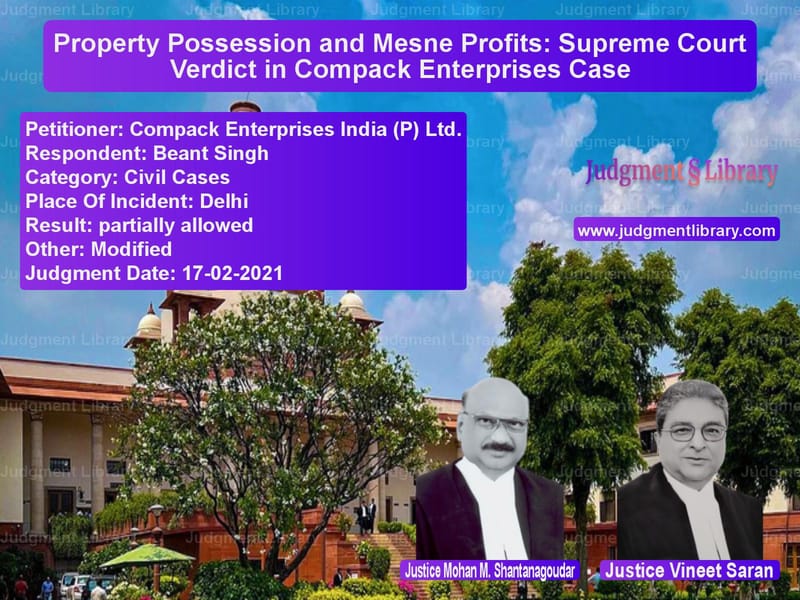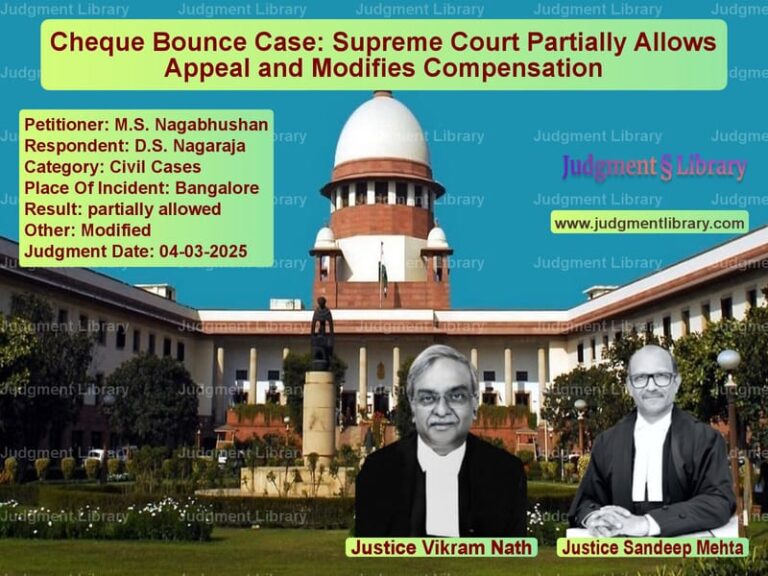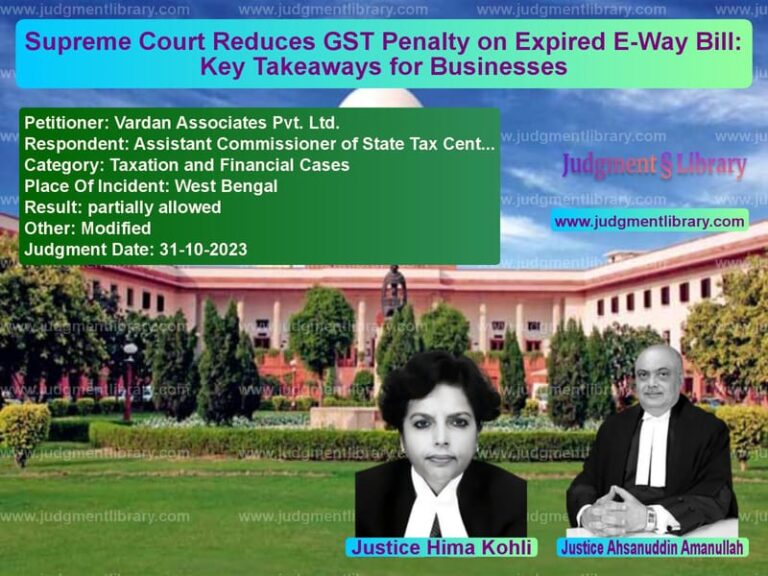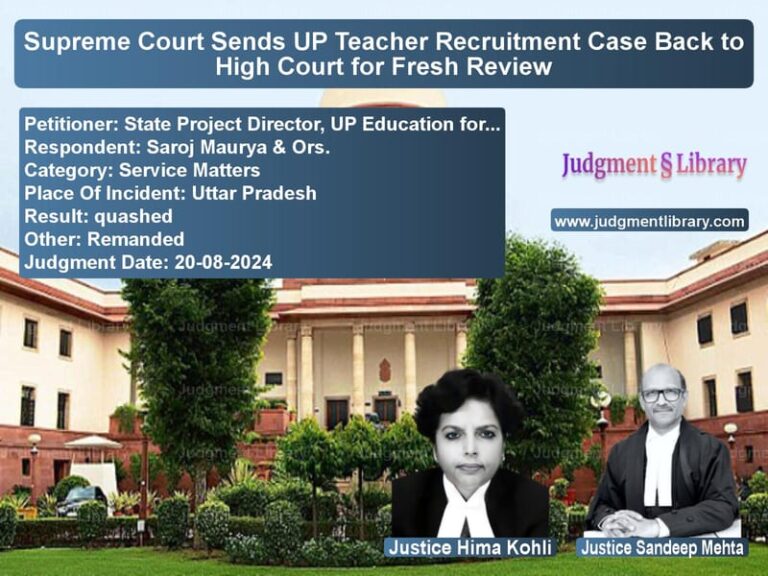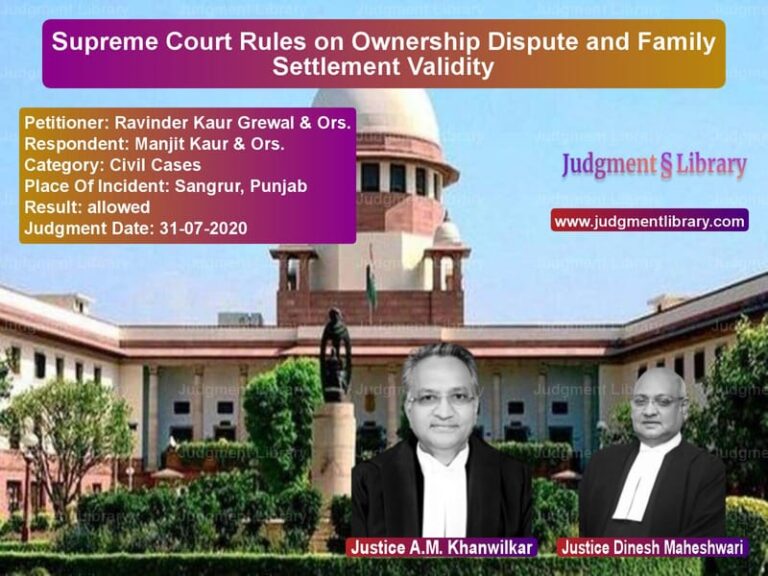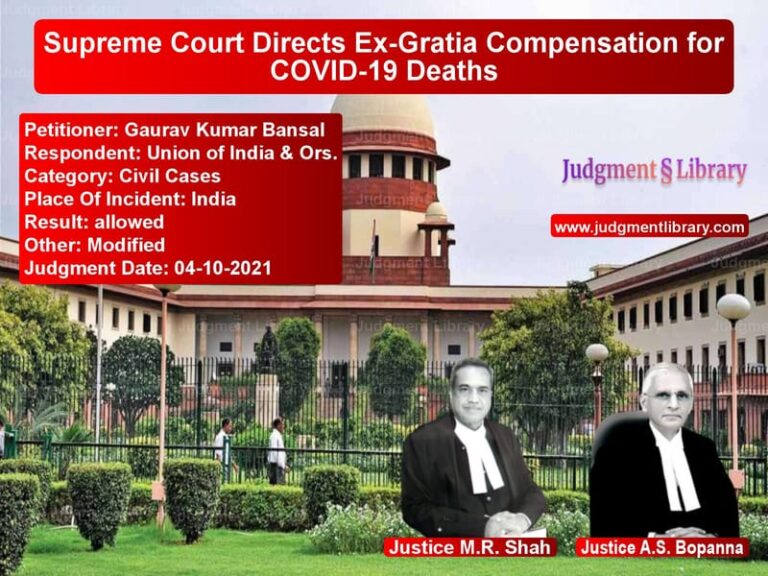Property Possession and Mesne Profits: Supreme Court Verdict in Compack Enterprises Case
The case of Compack Enterprises India (P) Ltd. v. Beant Singh is a critical legal dispute concerning property possession, lease agreements, and the liability of mesne profits. The Supreme Court was tasked with determining whether the appellant, Compack Enterprises India (P) Ltd., was in illegal possession of a commercial property after the expiry of a lease agreement and whether they were liable to pay enhanced mesne profits to the respondent, Beant Singh.
The dispute arose over the ground floor of property B-60, G.T. Karnal Road, Industrial Area, Delhi, measuring 5,472 square feet. The respondent, Beant Singh, filed a suit against the appellant for recovery of possession and mesne profits after the expiry of a lease agreement in 2008. The High Court ruled in favor of Beant Singh, directing Compack Enterprises to vacate the premises and pay mesne profits. The matter eventually reached the Supreme Court after the appellant challenged the High Court’s decision.
Background of the Case
The respondent, Beant Singh, was the owner of the disputed property. Through M/s Channa Auto Agencies (P) Ltd., of which he was a Director, he entered into a lease agreement with the predecessor of Compack Enterprises in 2000 for a period of 30 months at a monthly rent of Rs. 28,000. The lease agreement was subsequently renewed in 2003 at Rs. 30,800 per month and again in 2006 at Rs. 33,900 per month, expiring on September 30, 2008.
Despite the lease’s expiry, the appellant continued to occupy the property without any renewal. Beant Singh, therefore, filed a suit in 2009 for recovery of possession and mesne profits.
Arguments by the Petitioner (Compack Enterprises)
The appellant contended the following:
- They were in possession of only 2,200 square feet of the property, not the entire 5,472 square feet.
- They had paid rent till July 2015 as per an interim court order.
- Possession of the property had been handed over to one Mr. Ajay Gosain, who had entered into an agreement to purchase the property from Beant Singh.
- The High Court erroneously ordered the eviction of the entire property, despite the petitioner claiming only partial possession.
- The mesne profits awarded were excessive and should be reduced.
Arguments by the Respondent (Beant Singh)
The respondent countered with the following arguments:
- The appellant was in illegal possession of the entire 5,472 square feet.
- Their lease agreement had expired in 2008, and they had no legal right to continue occupying the property.
- The Delhi High Court, in an earlier judgment in 2014, had already ruled in favor of the respondent.
- The mesne profits were justified due to the appellant’s unauthorized occupation.
High Court’s Judgment
The Delhi High Court ruled:
- The appellant was liable for possession of the entire property measuring 5,472 square feet.
- The mesne profits were enhanced to Rs. 1,00,000 per month from October 1, 2008, with a 10% increase every 12 months.
- The appellant must vacate the premises and pay all arrears.
Supreme Court’s Analysis
The Supreme Court examined two critical issues:
- Whether the appellant was in possession of the entire property.
- Whether the mesne profits were correctly calculated.
1. Possession of the Property
The Court found:
“The material on record discloses that the appellant is presently in illegal possession of the entire suit property admeasuring 5,472 square feet.”
The Court further noted:
“The appellant’s claim of possessing only 2,200 square feet was already settled by the High Court in 2014, which decreed possession of the entire property in favor of the respondent.”
2. Mesne Profits
The Supreme Court found an error in the High Court’s order regarding the increment rate of mesne profits. The High Court had recorded a 10% increase every 12 months, whereas the original lease agreements had incorporated a 10% increase every 24 months. The Court ruled:
“We find that the intended compromise between the parties was a 10% increase in mesne profits every alternate year. The recording of a 10% increase every 12 months in the consent decree was an inadvertent error.”
Final Judgment
The Supreme Court ruled:
- The appellant was liable for vacating the entire 5,472 square feet of the property.
- The mesne profits should be recalculated with a 10% increase every 24 months, not 12 months.
- The appellant must vacate the property within eight weeks.
- All arrears of mesne profits should be cleared.
- A cost of Rs. 1 lakh was imposed on the appellant for delaying the matter.
Legal Significance
This judgment reinforces several key principles:
- Lease Agreement Compliance: Tenants cannot continue to occupy a property after the lease expires without proper renewal.
- Enforceability of Mesne Profits: Occupiers must compensate landlords for unlawful possession beyond lease expiry.
- Judicial Finality: Once a court decree has attained finality, attempts to re-litigate settled issues will not be entertained.
- Correction of Errors in Consent Decrees: Courts have the power to rectify mistakes in recorded consent decrees if an error is apparent.
This judgment sets a precedent for property disputes, emphasizing that lease violations will not be tolerated and compensation will be strictly enforced.
Petitioner Name: Compack Enterprises India (P) Ltd..Respondent Name: Beant Singh.Judgment By: Justice Mohan M. Shantanagoudar, Justice Vineet Saran.Place Of Incident: Delhi.Judgment Date: 17-02-2021.
Don’t miss out on the full details! Download the complete judgment in PDF format below and gain valuable insights instantly!
Download Judgment: compack-enterprises-vs-beant-singh-supreme-court-of-india-judgment-dated-17-02-2021.pdf
Directly Download Judgment: Directly download this Judgment
See all petitions in Property Disputes
See all petitions in Damages and Compensation
See all petitions in Judgment by Mohan M. Shantanagoudar
See all petitions in Judgment by Vineet Saran
See all petitions in partially allowed
See all petitions in Modified
See all petitions in supreme court of India judgments February 2021
See all petitions in 2021 judgments
See all posts in Civil Cases Category
See all allowed petitions in Civil Cases Category
See all Dismissed petitions in Civil Cases Category
See all partially allowed petitions in Civil Cases Category

